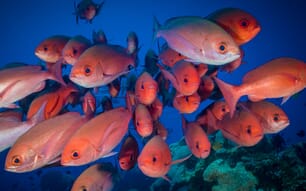The new gall crab, named Lithoscaptus semperi, was discovered inhabiting free-living corals of the species Trachyphyllia geoffroyi on sandy bottoms near coral reefs.
Host specificity is observed in gall crabs, which means that a gall crab species inhabits one or several closely related coral species. The new gall crab species discovered in this study is so far only known to inhabit Trachyphyllia corals.
Gall crabs are very small at less than 1 cm in size, and live in a 'dwelling' in stony corals.
Gall crab larvae settle on a coral as a larvae and the coral then grows around the crab, creating a 'dwelling'. These dwellings are named galls, which explains the common name of the crabs.
Female gall crabs are about two times larger than males. Because of their larger size and the large number of eggs they can carry, they cannot leave their galls and become 'imprisoned'. Males (presumably) can leave their dwellings and move around freely.
"When I started working on gall crabs, I had a hard time finding them because of their small size", says Sancia van der Meij, the author of the study. "But once I knew how to recognise their dwellings, I realised they are actually very common on coral reefs."
WWF-Malaysia funded the field study, and their Head of Marine, Robecca Jumin, said: "This study highlights the need to protect our coral reefs.
"New species are still being discovered as the proposed Tun Mustapha Park (TMP) is still largely unexplored."
If the proposal is accepted, the TMP will be the largest marine protected area in Malaysia, encompassing almost a million hectares of mangrove, seagrass and coral reefs.
Top image credit: BT Reijnen/SET van der Meij



